- Home
- Irvine Welsh
The Blade Artist Page 2
The Blade Artist Read online
Page 2
4
THE WORKSHOP
Guns n’ Roses’ Chinese Democracy blasts out from a large sound system at a volume that almost pushes Martin Crosby right back out of the heavy reinforced door he’d slid open in order to enter the small studio. A traditional stack stereo system and its huge dominant speakers are crammed into a window- and sky-lit space that’s barely big enough to contain a kiln and an easel, with some paints and building materials stacked on the floor. He can’t see Jim Francis at his workbench but the heads of the Hollywood actors and pop stars lined up on shelving are recognisable to Martin, in spite of the implausibly creative mutilations the artist has subjected them to. A blockbuster star has his razored face crudely stitched back together. A cable-series icon has been cursed by a massive tumour growing out the side of his head. A pop princess has cruelly lost an eye.
Then, suddenly, the music stops and Francis is at his shoulder holding a remote, making Martin jump. The artist says nothing to his agent, as is generally his way. Martin Crosby, himself a calm, taciturn man, who prefers to listen as he peers out from over silver-framed spectacles, has plenty of ungrateful clients, some who see his role, at best, as a necessary evil. Yet he’s never had one as – hostile wasn’t the right word, that would almost be an improvement – as unmoved as Francis. He’s just driven two and a half hours on the choked interstate to offer support for his artist and his forthcoming exhibition, and all he gets from Jim Francis is, — So what you brings you up here, then?
As Martin explains, rubbing at a beard shaved to the same bristle-length as his hair, Jim Francis merely says, — All going okay. I’d best be getting back to it, and he points to a small fridge. — Help yourself to a bottle of water, as he picks up the handset and what to Martin is charmless, overproduced rock music fills the air and assails his eardrums. He goes to speak but realises the futility of doing so as Francis walks to his sculpture in the corner, hunching over another head, moulding it violently with his big calloused hands, and ripping at it with a selection of knives.
Yet it is almost worth coming up, just to see Jim Francis at work. It really is a sight to behold. Most sculptors are heavily orientated towards the physical, but it seems to Martin that Francis’s controlled rage is scored by the music’s chopping, ripping guitar work and raw vocals, to the extent that he actually lets the sound guide him across the clay. It is as if the band is composing this head, and they are using Francis as a conduit. Attached to the wall at his side are magnetic strips, which hold all types of knives. Most are the traditional thin stainless-steel blades he’s seen other artists use for clay sculpting, but there are some larger ones that look like hunting knives, while others appear to be a surgeon’s operating instruments. He recalls Francis once said in an interview that he likes to use utensils not traditionally associated with sculpting.
Jim Francis is a strange one, no doubt about that, Martin considers, though this quality is hardly unique among his client base. Artists are artists. Martin had wanted to talk about next month’s opening, to make sure all the pieces would be ready for exhibition, and how best to set it up. This wasn’t easy. Francis has an email account but never responds to Martin’s overtures, nor does he return his texts. The phone conversations, when he deigns to pick up, are an exercise in gruff minimalism. The last time they’d spoken, Jim Francis had just said, in that gravelly accent of his, — Remember to invite Rod Stewart to the opening, before hanging up.
So Martin has come up from Los Angeles, and so far it is odds-on that it will prove to be a waste of a day. This really isn’t acceptable. In his mounting frustration, Martin shouts at the artist’s back, but the music is too loud and something makes him shy about physically touching Jim Francis, even the minimal contact to indicate that a conversation would be welcome. He sees his chance when the track changes and Axl Rose’s scream briefly fades. — JIM! . . .
The artist swivels round and grabs the handset, switching off the music. He looks calmly at Martin.
— I appreciate that you’re very busy and I greatly admire your work ethic, but we have some major decisions to make about the exhibition. I really need some undivided time with you. I’ve driven up from LA –
— Okay, Francis snaps in agitation, then seems to thaw a little, — give me an hour and we’ll go and grab a late lunch. Go through to the house and Mel will get you a coffee or a beer or something, and he slams the music back on at a volume that makes Martin Crosby keen to comply. Closing the door behind him, Martin moves into a small anteroom, then the main house itself. The studio was probably an old garage, in some way part of things here, but not in others. A bit like Francis himself, he speculates.
Martin has only met Jim Francis’s wife, Melanie, once before, at the opening of a show. Again, she is as friendly and engaging as his client is brusque and distant. Her blonde hair is held back by a red band, and she wears grey sweatpants and a red tanktop. An exercise mat had been placed on the floor in front of a giant flat-screen TV, and weights and elasticated resistance cords attested, along with a thin layer of sweat on her brow, to her recent exertions.
Melanie gets some cold bottles of water for them both, and sits Martin down on the couch. She lowers herself into a padded armchair opposite, folding her legs into a lotus position. — Jim can be pretty intense when he’s working. I admire his single-mindedness, I get too easily distracted, but it isn’t always fun to be around. She shakes her head in cheerful affection, letting Martin know that this observation isn’t intended as a slight to her husband.
It is closer to an hour and a half when Jim Francis emerges, by which time Martin has grown hungry, although Melanie’s agreeable company has distracted him. Francis nods at his wife. — Won’t be long, he says, then turns to Martin and briefly raises his eyebrows. To end up with a woman so outgoing, vivacous and good-looking, and far younger than her husband, Jim Francis must possess some kind of charm, but Martin Crosby has always struggled to find it.
They get into Francis’s station wagon and journey in silence to downtown Santa Barbara, stopping at a beachside cafe called the Shoreline. They head for a table in a tent-covered al fresco area looking out onto the Pacific, and Martin notes that Jim Francis seems more relaxed. He spies a couple with a big, wrinkled oriental dog, greeting them by shaking the man’s hand, kissing the woman’s cheek, then aggressively petting the enthusiastic animal. — Neighbours, he explains to Martin, as they take their seats. Francis smiles easily at the approaching young waitress. — How’s things, Candy?
— I’m good, Jim, she sings, dispensing a flashbulb smile.
Martin joins his client in ordering an egg-white omelette with spinach and feta cheese, and a side of fresh fruit. He fires up his Mac, displaying representations of layouts, and different floor-plan options where paintings could be hung and sculptures mounted. Martin starts to explain the natural and placed lighting and the different effects they would have on the various pieces. — I thought if you could spare an afternoon or morning to drive down and see the space, he begins, before Francis silences him with a firm tap on the first set of configurations on the screen. — This one’s fine, he says.
— Well, it does have certain advantages, Martin agrees, pointing at the image, — but the problem is that there’s the brick wall here and no window –
— It’s fine, Francis reiterates, looking over to a nearby table where a group of Independence Day revellers are drinking off hangovers with bottles of Corona beer turned upside down, tipped into outsized glasses of margarita.
— Well, uh . . . okay, Jim, I guess it’s your call. Martin Crosby smiles tightly. — I like the understated classical pillars to mount the head sculptures, giving it a kind of last days of ancient Rome effect –
— Aye, sound. Did you ever hear back from Rod Stewart’s people? Francis interjects, as the server arrives with the omelettes.
— Nothing yet. I’ll get Vanessa to chase it up, Martin says in increased despondency, watching Francis throw some hash browns towards th
e scavenging gulls that loiter on the sands outside the patio area. To his eyes, his client seems to derive an inordinate amount of pleasure from the act of feeding those aggressive birds. He is particularly taken by one that hangs in the air on the thermals, careful to chuck food its way, enjoying its excited screeches, oblivious to the patent disquiet of the cafe’s other patrons.
Later, when Martin Crosby is driving back to LA, his assistant puts a call through to him on his car speakerphone. It isn’t Rod Stewart, or any of his representatives. It is a woman with the same sort of accent as Jim Francis’s, and she claims to be his sister.
5
THE CALL
He hadn’t heard Elspeth’s voice in several years. Yet he recognised it straight away on the phone, without checking caller ID. Not that it would have come up, as they had long since lost touch. Their mother had died a few years back, after Jim had moved to the USA. Jim returned for the funeral, but had headed back to LA immediately afterwards. He had changed his number since then, without bothering to tell her. How had she got it? Elspeth was resourceful. His younger sister, ten years and four months between them. His brother Joe, just over a year older than him. And why was she getting in touch? It had to be about Joe, he was a heavy drinker. The drink took their father. It would get Joe too. — Elspeth . . .
— I googled you. Got your number from your agent. Took me a while to work out it was actually you . . . the Jim thing. Anyway, it’s not good news . . . Her voice wavers. — I’m really sorry . . . he can sense her crippling hesitancy, — . . . but Sean died yesterday. He was found in his flat.
Sean . . . what the fuck . . .
— That’s all I know right now, Elspeth says, a sad, fretful pain in her voice. More than the news, which provides only shock, her tone moves Jim Francis, as he and his sister hadn’t parted on good terms. — I’m so sorry . . .
Jim’s brain is scorched by the questions that pop into his head, jostling for his focus. He sucks air through his nose, filling his lungs. He thinks of June, the woman by whom he’d had Sean, and another boy, Michael. She’d presented the firstborn to him with an almost defiant pride. See? See what I can do? He’d felt some strange kind of personal vindication that had been beyond his expression, but little else. Then he’d gone to the pub and bought drinks for everybody and got hammered. A vision of baby Sean’s face, then June’s, and all the boys in that pub, suddenly sears into his consciousness. And then there’s Elspeth’s, his sister, now silent on the phone line. How proud she was then, as a young girl, to be an auntie. They all seemed to belong to a different life, one lived by somebody else. He looks at his tanned countenance in the mirror on the wall. Melanie is hovering behind him, her own face tense in the reflection. When Grace and Eve had come along it had been so different. He’d felt himself as something small, yet part of an infinite cosmos, and swarmed by an internal kaleidoscope of emotion, he’d cried and squeezed her hand.
— Are you still there? Elspeth’s voice on the line.
— You got a number for June?
Elspeth slowly enunciates the digits, which he taps into his iPhone with his free hand.
— Obviously I’ll be over. Will you phone me if you get any more details?
— Of course I will.
— Thanks . . . he coughs out, then lowers the landline receiver onto the cradle.
— It’s Sean, he says to Melanie. — He’s dead.
— Oh my God. Melanie clasps her hand to her mouth. — What happened?
— Found dead back in Edinburgh. Jim’s voice is flat and even. — I have to get over there, for the funeral, and to find out what happened, obviously.
— Of course, Melanie gasps, wrapping her arms around him. He is tense; she feels like a sweater hanging on a bronze statue. — What did they say?
— He’s dead, that’s all I know.
She lightens but maintains her grip on him. His bearing reminds her of when she first tried to hold him, when they got together, that terrible stiffness in his body. — I feel so bad, I never knew him, or Michael.
Jim is silent, as still and immobile as one of his pieces of sculpture. Melanie can feel his tension seeping into her, hardening her. Breaking off her grip, she lets her arms fall by her sides. — You won’t get involved in anything over there, will you?
Jim shakes his head dismissively. — What’s to get involved in? I just want to find out what happened, go to his funeral, he says, then adds, in a different voice, — see whose tears are real, whose are crocodille, and he moves through to the small office, sits down in front of the computer and goes online.
— Jim . . .
— You say you never knew him. Neither did I, Jim mutters, his dark brown eyes clouding. — When he was younger he was just a distraction to me. An irrelevance. Then I was in the jail. I did everything wrong with him and his brother, he says, seeming to Melanie to grow almost conversational in his tone, like he is talking to someone else. It disconcerts her, and he picks up on it, sinking his voice. — When I had kids I said I’d never be the way my old man was with me. And I kept my word; I was worse, he allows, almost bluntly, as he pulls up the American Airlines page on the screen. Then he turns to her and says, intently, — But I’m different with the girls.
— Of course you are, you’re a great dad, Melanie says, probably a little too urgently. — It’s different now. You were too young, you –
— I was addicted to violence, Jim coldly confesses, tapping in information and pulling out his credit card. — But I’ve got that nonsense under control now, cause it doesn’t take me anywhere interesting. Just jail. Done too much of that.
— Yes. Melanie looks at Jim, squeezes his hand. She tries to find him, this man she’s married, whom she’d taken with her back to the States. All she can see is a Scottish jailbird she’d met years ago called Francis Begbie.
6
THE DELIVERY BOY 2
They came by the house on Friday nights for card school, when my ma was at the bingo. There was Grandad Jock, Carmie, Lozy and the much younger man, ‘Handsome’ Johnnie Tweed, the only one of them who ever gave me money. He’d take me aside and crush the odd quid note or ten-bob bit into my hand, and tip me a wee wink, so I knew that this was just between us. They were an arrogant, entitled quartet, prone to swaggering around in long Crombie overcoats and trilbies. I was fascinated by them all, so was my brother Joe.
My dad would be pished, with my uncle Jimmy. He was always rat-arsed. My ma would throw him out, sometimes for years. When he came back he’d be sober for a while, but that never lasted. Then he went away for ages. They said he was working on the rigs, but I knew he was in the jail or kipped up with some dozy hoor. Then he returned once more, and stayed long enough to give Ma my wee sister, Elspeth.
I eagerly anticipated those Friday nights, even if they had a strange edge to them. Grandad Jock would be nursing a beer, which he rarely finished, and sipping at a whisky. One only. He’d look at his two sons: drunk, sprawling, flatulent and loud-mouthed, and even as a kid, I could feel him seethe with disappointment. I suppose it was something that we shared.
My ma hated him and his trio of mates. Gangsters, she called them. Back then, in the late seventies, they were among the last men on the dwindling docks. All of them, bar Johnnie, had been there since the war and were nearing retirement. The older three, through being in a reserved occupation, had missed all the fighting. I always thought it ironic that cunts thought of as hard had used their job status to shite out from swedging the Nazis. But personal gain was their real motive. — They took everything that was meant for the working people, I mind my mother once saying to me. — Stole fae their ain. The war stuff, it was meant for everybody, no just they thieving ratbags.
That was a wee bit disingenuous. I’d look around at all the stuff in our house compared to the scruffs’ hooses. We had everything, until the old man pished it away. And you knew where it all came from. I never heard any talk from my ma of sending it back.
But she tried to ke
ep me away from Grandad Jock and his mates. I was thirteen and in first year at school when they started to take an interest in me. That they didnae give a fuck about my brother Joe, fourteen months my elder, was good. It made me feel important.
Not a lot did back then.
I struggled with reading throughout primary school, and was put in dumbo classes in secondary. Letters and words on a page meant nothing, they were just a smudged code I couldn’t crack. I would, many years later, be diagnosed as dyslexic. But back then the teachers and snobby kids laughed at me for being slow and stupid. I raged inside, with such force that I nearly made myself sick. Sitting there, at my desk, my breathing tight, almost passing out with fury. Then I learned that letting that rage out was the way to stop the laughter: to stop it by turning it into blood and tears.
So it felt good to be valued, by Grandad Jock and his pals; those bold, sly men, whom people seemed to fear and respect. Johnnie Tweed, though, I could never figure out. He was more ages with my dad, and I always thought he should have been his mate, rather than my grandad’s. As his nickname suggested, ‘Handsome’ Johnnie was a good-looking guy with big white teeth and a shock of dark bath-brush hair, cut in a short crew. He smelt of strong aftershave, cigarettes and alcohol, like all the men did when you were a kid, but there was always something a bit more fragrant about Johnnie.
I hated school, and worked part-time as a delivery boy at R & T Gibson, a grocer’s in Canonmills. I’d ride the big, black metal-framed bike, with boxes of groceries stuck in the huge basket at the front of it. I’d pedal this heavy monstrosity along busy streets, my skinny wee legs pumping hard just to keep it upright. I also stacked the shelves in the shop. The owner of the store was not called Gibson, but Malcolmson: a high-voiced, excitable cunt. Malcolmson was always bossing me around, along with Gary Galbraith, the other schoolkid who worked there.

 If You Liked School, You'll Love Work
If You Liked School, You'll Love Work Ecstasy: Three Tales of Chemical Romance
Ecstasy: Three Tales of Chemical Romance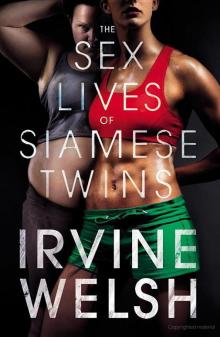 The Sex Lives of Siamese Twins
The Sex Lives of Siamese Twins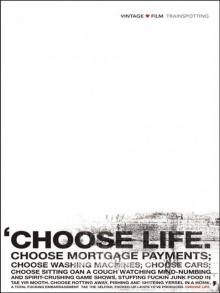 Trainspotting
Trainspotting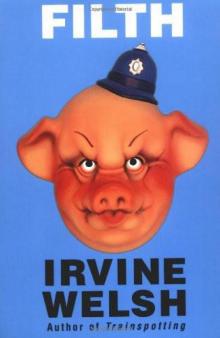 Filth
Filth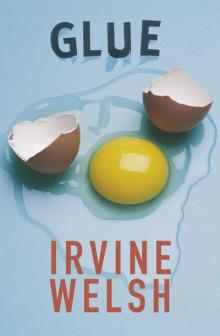 Glue
Glue Marabou Stork Nightmares
Marabou Stork Nightmares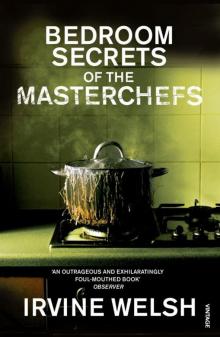 The Bedroom Secrets of the Master Chefs
The Bedroom Secrets of the Master Chefs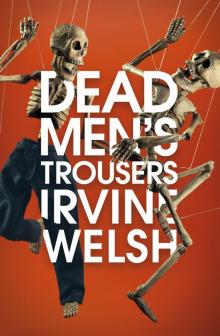 Dead Men's Trousers
Dead Men's Trousers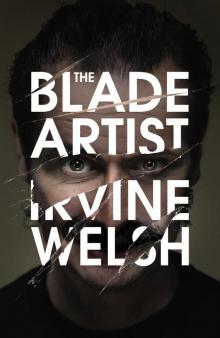 The Blade Artist
The Blade Artist Crime
Crime The Acid House
The Acid House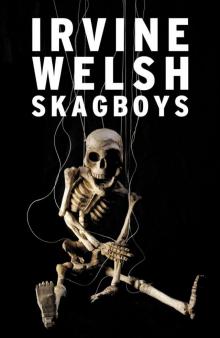 Skagboys
Skagboys Ecstasy
Ecstasy